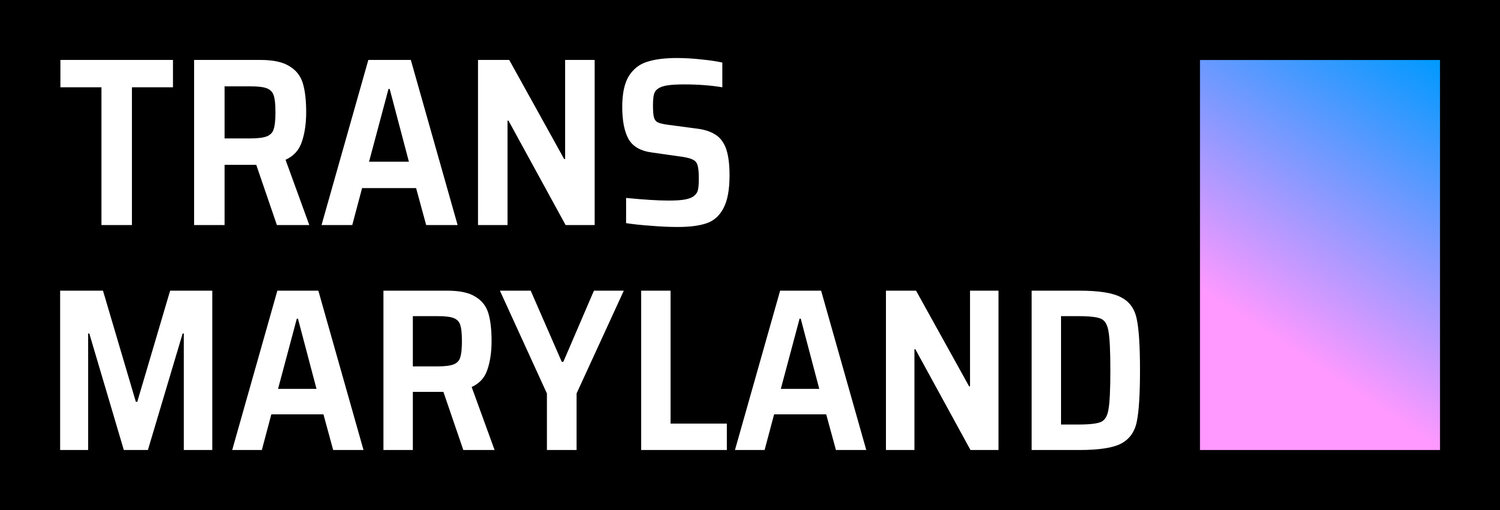Press Release on SB196/HB421
Maryland General Assembly Passes Bill to Allow Third Gender Option for ID, Streamline Gender Change Process
Annapolis, MD: Today, by a vote of 92-48, the Maryland House of Delegates joined the Maryland Senate in passing legislation that will allow the state’s residents to select a third gender option on their driver’s license or state ID. Maryland joins eight states and the District of Columbia in providing a third gender option. The act also streamlined the process for changing gender on state-issued ID.
In addition to the two existing options of Female and Male, under the new law Marylanders will be able to have the gender on their ID listed as “Unspecified or Other,” which appears on the driver’s license or ID as an X.
The X gender marker will be available to all Marylanders who do not want to be identified as Male or Female on their driver’s license, and will be of greatest benefit to nonbinary, genderqueer, and intersex Marylanders who do not identify as either Female or Male. Nonbinary and genderqueer are umbrella terms for people with gender identities that fall somewhere outside the traditional conceptions of female or male, while intersex is an umbrella term used to describe a number of natural bodily variations, which can include external genitalia, internal sex organs, chromosomes, or hormonal differences that transcend typical ideas of male and female.
“This modernizing legislation will be bringing me personally the ability to have an accurate identification document, and I am grateful for the dedicated coalition that worked so hard to make X ID markers a reality,” said Lee Blinder, founder of Trans Healthcare MD. “My work with Trans Healthcare MD has shown me the sincere need for this legislation, and I know the lives of my fellow transgender, nonbinary, and gender expansive community will improve after its implementation on October 1, 2019,” Blinder said.
Jaz Barnett, Co-Director of Media and Technology for The Baltimore Transgender Alliance, described themself as being “over the moon” about the bill’s passage. “This is incredibly important to me because the X means a lot more than just a letter—the M or the F just doesn’t fit and doesn’t reflect who I am in the least. It often is very humiliating to go into different establishments where I do have to show my ID to other people, and they’ll see that there’s a letter on there that doesn’t represent who it is that I am,” Barnett said.
Lisa Reff, a parent of a nonbinary teen, spoke about the impact the law will have on their child’s life. “I never gave any thought to all of the different forms we fill out that require us to select male or female until my older daughter was applying for her driver’s license a year-and-a-half ago. She selected female, no big deal. But I sat there and I thought, ‘oh my goodness, this is going to be a big deal for Kayden. I'm just so happy that Kayden will be able to get a license that identifies them as they identify,” Reff said.
The new law will also streamline Maryland’s currently-onerous process for changing one’s gender. Under the current process, individuals seeking to change the gender on their driver’s license or state ID are required to submit a letter from a medical professional providing transition care, as well as a separate letter from a mental health professional. Now, Marylanders will be able to self-attest their appropriate gender marker without having to go through multiple medical gatekeepers.
Today’s legislation has been strongly supported by a broad coalition of LGBTQIA+ groups, including The Baltimore Transgender Alliance, FreeState Justice, HostHome, the Intersex & Genderqueer Recognition Project, Maryland Trans Unity, the National Center for Transgender Equality, Trans Healthcare MD, Trans Recognition Maryland, Trans Terps and Whitman-Walker Health, as well as a host of individuals who will benefit from this legislation and their families.
The Senate bill, SB196, submitted by Senator William C. Smith, passed 32-14 on February 22, 2019. House bill 421, sponsored by Delegate Sara Love, passed today 92-48. The bill passed both houses with votes from more than 60% of legislators, making it presumptively veto-proof.

